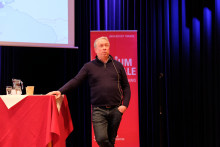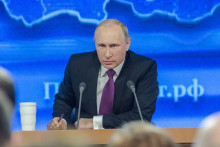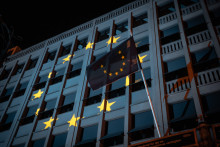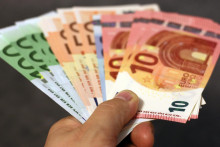There was not much of note in Putin’s long-awaited May 9 speech, says Donnelly as he looks back at the recent news events. ‘The most striking thing I noticed lately were the Russian troops with Soviet flags in parts of Ukraine. That gave a kind of back to the future feeling. It seemed to be a reference to the political system of that time, but also to the former territory of the Soviet Union. I think several countries from the former Union raised their eyebrows at this flag display.’
Between a rock and a hard place
What the UT researcher found more striking was the news about Belarus' possible involvement in the Ukraine war. It increasingly looks like Putin is pressuring them to participate militarily in the war in Ukraine, says Donnelly. Although it remains to be seen exactly how much. ‘There is a lot of manoeuvring going on in Ukraine right now. Both Russia and Ukraine are trying to keep each other guessing about how much they have to fight where, leading them to split up their troops. If Belarus attacks in the North, Ukraine is forced to send additional troops to the northern border, and this would weaken the Ukrainian army in other parts of the country.'
Although Belarus appears to be increasingly active militarily on its southern border, President Lukashenko was equally critical of the course of the war. ‘There is little to gain for Lukashenko if he becomes more involved in this war’, Donnelly explains. ‘He wants to be ‘just’ a dictator in his own country. But Belarus is economically largely dependent on Russia, for example for its energy supply. That is the leverage Putin has over Lukashenko and that is what the Russian president will use. Belarus is between a rock and a hard place, and that makes it very difficult to say ‘no’ to Putin.'
Viktor Orbán
Belarus is not the only country dependent on Russia. To a lesser extent, several European states are also dependent on Russian natural resources, especially oil and gas. Hungary, in particular, shows little enthusiasm for new sanctions to boycott Russian oil, Donnelly says. ‘In a way, Hungary is also between a rock and a hard place. They want to belong to the EU and NATO, but at the same time they are dependent on Russian natural resources. The ambivalent attitude can also be seen. Hungary does not supply weapons to Ukraine, for example. This attitude is a success for Putin and a problem for the West. It is also a consequence of the EU's tolerant attitude towards the Hungarian leader Orbán. Angela Merkel also played a decisive, unglamorous role in this. And now the chickens have come home to roost.’
Successful sanctions depend on collective action, Donnelly explains. ‘If the EU is smart, they will find a way to get Hungary on board, for example with side payments by supplying alternative energy sources from the Gulf States or the US until the energy transition is complete. I am cautiously optimistic about that. Yet, the EU has also planned sanctions against Hungary for violating the rule of law. It is possible that Orbán will take advantage of the situation by saying: we agree with the sanctions against Russia, but then the sanctions against us must be lifted or postponed. This is a tricky situation for the EU.’
Europe will have to find a collective response, as Donnelly believes the war in Ukraine is far from over. ‘I have said that from the beginning. And it even begins to resemble the situation in the First World War, where Germany advanced rapidly in the first weeks, but then completely stalled. After that, the two sides ended up in a trench warfare that lasted for years until occupied territories in France and Belgium could be liberated again. If Russia fails to collapse, I fear the same will happen in Ukraine.’







